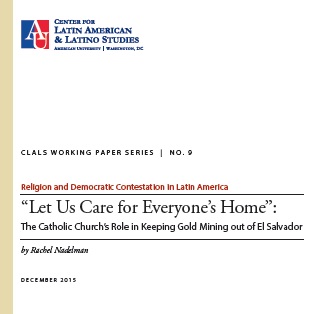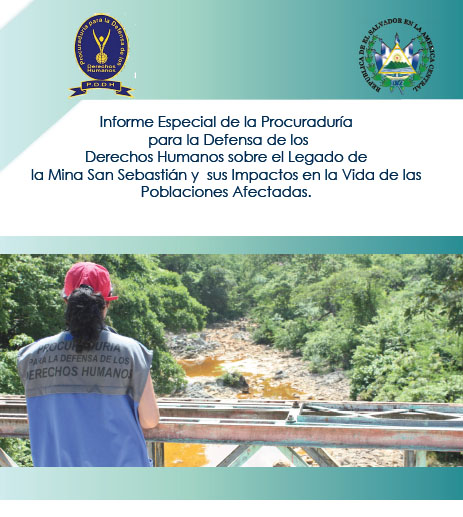- Details
-
Category: Background and reports
-
Published: Monday, 14 March 2016 16:32
Goodland, Robert. “Responsible Mining: The Key to Profitable Resource Development,” Sustainability4, no. 9 (2012): 2099-2126. Available at: http://www.mdpi.com/2071-1050/4/9/2099
- Details
-
Category: Pacific Rim/OceanaGold
-
Published: Monday, 07 March 2016 15:35
By Wilber Ruano: RNES
 An investigation by MiningWatch Canada reports that the activities of the El Dorado Foundation, originally established by Pacific Rim in El Salvador in 2005, and now run by OCEANAGOLD, violate the rights of the inhabitants of the department of Cabañas.
An investigation by MiningWatch Canada reports that the activities of the El Dorado Foundation, originally established by Pacific Rim in El Salvador in 2005, and now run by OCEANAGOLD, violate the rights of the inhabitants of the department of Cabañas.
Researcher Jennifer Moore stressed that mining companies create foundations to disguise their intentions, but basically are just looking to extract riches at the expense of human rights violations of the inhabitants of the area.
Read more ...
- Details
-
Category: Pacific Rim/OceanaGold
-
Published: Monday, 07 March 2016 14:56
By Gloria Orellana - CoLatino
 "The activities of the El Dorado Foundation are misleading, are dangerous and show a lack of deep respect for the people of Cabañas and El Salvador," said Jennifer Moore, Coordinator of the Latin America Program Mining Watch Canada, while presenting a joint research document with the National Roundtable against Mining.
"The activities of the El Dorado Foundation are misleading, are dangerous and show a lack of deep respect for the people of Cabañas and El Salvador," said Jennifer Moore, Coordinator of the Latin America Program Mining Watch Canada, while presenting a joint research document with the National Roundtable against Mining.
The document entitled "Mining, corporate social responsibility and conflict: Oceana Gold and the El Dorado Foundation in El Salvador", establishes that the actions of the foundation have the same objectives of Pacific Rim Mining and its successor OceanaGold which seek to develop a mining project that is controversial due the population density and pollution it would generate.
Read more ...
- Details
-
Category: Background and reports
-
Published: Thursday, 03 March 2016 09:07
A recently published essay by Phd candidate Rachel Nadelman looks at the role of the Catholic Church in the anti-mining struggle in El Salvador.

Abstract:
"A majority of Salvadoran citizens and political leaders alike are opposed to mining, citing the country’s environmental degradation, population density, and limited water resources. Yet opposition to industrial gold mining has not always been the majority position in El Salvador. As recently as the early 2000s, the Salvadoran government, with support from international donors and creditors, pursued metals mining as an opportunity for economic growth. The story of how El Salvador diverged from this extractivist path is multi-faceted. A key element has been the strategic involvement of the Salvadoran Catholic Church. This working paper explores the Church’s influence on the Salvadoran government’s decision to suspend all metals mining. The analysis examines the theological and practical motivations for the Church’s stance on mining. It also describes the strategic actions taken by the Church to promote its position. Ultimately, the involvement of the Catholic Church served to strengthen the grassroots anti-mining movement, to shape the public debate, and to sway the electorate, which proved decisive in the suspension of all industrial metals mining in this country." DOWNLOAD THE STUDY HERE
- Details
-
Category: Commerce Group
-
Published: Wednesday, 02 March 2016 17:38
The Attorney for the Defense of Human Rights released a Special Report on the toxic legacy of the San Sebastian mine and the impacts on the human rights of the affected populations.
 The Special Report, written by an international multidisciplinary team of experts in human rights and international law, hydrology and economics, concludes that the San Sebastian mine has instituted a negative legacy of mining in the broadest sense and recommends a series of actions aimed at remedying the damage to ecosystems, reparation for affected communities and measures to improve the human rights of people that inhabit the area. It urges the approval of a law prohibiting metal mining permanently in the country and demands that Commerce Group Corporation and its subsidiaries finance part of the cost of prevention and remediation of acid drainage resulting from their activities in the area.
The Special Report, written by an international multidisciplinary team of experts in human rights and international law, hydrology and economics, concludes that the San Sebastian mine has instituted a negative legacy of mining in the broadest sense and recommends a series of actions aimed at remedying the damage to ecosystems, reparation for affected communities and measures to improve the human rights of people that inhabit the area. It urges the approval of a law prohibiting metal mining permanently in the country and demands that Commerce Group Corporation and its subsidiaries finance part of the cost of prevention and remediation of acid drainage resulting from their activities in the area.
Read more ...
- Details
-
Category: Mining prohibition El Salvador
-
Published: Wednesday, 03 February 2016 16:36
Anna Backmann and Christian Wimberger: CIR
 People taking part in the delegation from the United States, Canada, France, and Germany together with workers of the organization ADES.
People taking part in the delegation from the United States, Canada, France, and Germany together with workers of the organization ADES.
El Salvador, November 2nd to 10th, 2015
As we step into Bernardo Belloso’s office in San Salvador on November 3rd, the numbers on a whiteboard catch our attention: 99%, 98%, and 99,25%. They are the results of referenda against mining held in El Salvador. Three municipalities have already voted NO – and almost unanimously so. Therefore the expectations for the referendum in Arcatao are high from the beginning. “Of course this time we want to reach 100%”, president of CRIPDES Bernando Belloso says, as if it were obvious.
Read more ...

 An investigation by MiningWatch Canada reports that the activities of the El Dorado Foundation, originally established by Pacific Rim in El Salvador in 2005, and now run by OCEANAGOLD, violate the rights of the inhabitants of the department of Cabañas.
An investigation by MiningWatch Canada reports that the activities of the El Dorado Foundation, originally established by Pacific Rim in El Salvador in 2005, and now run by OCEANAGOLD, violate the rights of the inhabitants of the department of Cabañas. "The activities of the El Dorado Foundation are misleading, are dangerous and show a lack of deep respect for the people of Cabañas and El Salvador," said Jennifer Moore, Coordinator of the Latin America Program Mining Watch Canada, while presenting a joint research document with the National Roundtable against Mining.
"The activities of the El Dorado Foundation are misleading, are dangerous and show a lack of deep respect for the people of Cabañas and El Salvador," said Jennifer Moore, Coordinator of the Latin America Program Mining Watch Canada, while presenting a joint research document with the National Roundtable against Mining.
 The
The  People taking part in the delegation from the United States, Canada, France, and Germany together with workers of the organization ADES.
People taking part in the delegation from the United States, Canada, France, and Germany together with workers of the organization ADES.